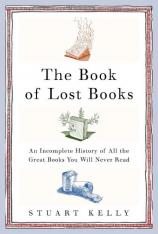The Book of Lost Books: An Incomplete History of All the Great Books You'll Never Read
Review
The Book of Lost Books: An Incomplete History of All the Great Books You'll Never Read
For all the sad words of tongue and pen
The saddest are these: It might have been
John Greenleaf Whittier's opinion is most apt when it comes to THE
BOOK OF LOST BOOKS, a collection of never-to-have-been writings by
authors of varying degrees of fame and popularity.
Beginning with the timeless "Anonymous" and ending with the likes
of Sylvia Plath, Ernest Hemingway and William S. Burroughs, Stuart
Kelly will have literary readers pondering "what if."
What if Dante had not died before finishing THE DIVINE COMEDY,
leaving his sons to finish the final cantos?
What if Sylvia Plath's sister-in-law, with whom she didn't share
the closest of relationships, had not been given charge of the
writer's estate?
What if Kafka hadn't requested that his "notebooks, manuscripts,
letters, my own and other people's sketches and so on…is to
be burned unread to the last page"?
Kelly runs the gamut of historical authors, from Homer to Georges
Perec, author of LIFE: A USER'S MANUAL. It's a real hodgepodge of
writers, some quite a bit eclectic; a bibliophile's dream. Of
necessity, all authors share a similar trait: they're dead. So
there's a wistful sense of "what might have been," along with a
sadness of opportunity lost.
"Some writings are absent, presumed destroyed," writes Kelly in his
introduction. "There are other works that are lost in the sense of
being misplaced."
There's no real speculation about the quality of the "missing"
literatures. Like a star athlete, projections are made based on
"past performance." How much more famous, if not successful, could
any of them have been had those "lost books" been completed, or
simply not lost? Would we revere Hemingway even more had he
not been so careless?
The author's style reminds me of someone who's had just a wee bit
too much to drink and starts rambling, "Boy, you should have seen
Ernest in his day. You think he was good? He could have
really been something with those extra pages."
Kelly is, in fact, a bit of a downer when he reminds us about the
fragility and brevity of, to borrow a title from Douglas Adams,
Life, the Universe and Everything. New technologies will not stem
the flood of time. Paper gives way to CDs as the preferred method
of data storage and something will replace CDs in a generation or
so. "The coronoscope of our sun will eventually edge forward,
engulfing Mercury, frazzling Venus. In thousands of thousands of
years, Earth will scorch like an insignificant piece of paper. As
the Bible says, the skies will roll up like parchment," he observes
morosely.
Why bother then? "In trying to preserve what makes us human, we
prove our humanity….We struggle unsuccessfully against
oblivion, and the struggling itself is our success."
In thinking so, maybe Kelly's title has another meaning: Perhaps
you'll never read the books because life is just too short.
Reviewed by Ron Kaplan on January 7, 2011
The Book of Lost Books: An Incomplete History of All the Great Books You'll Never Read
- Publication Date: April 18, 2006
- Genres: History, Nonfiction, Reference
- Hardcover: 368 pages
- Publisher: Random House
- ISBN-10: 1400062977
- ISBN-13: 9781400062973




